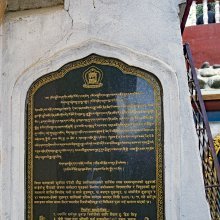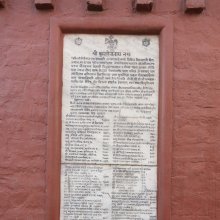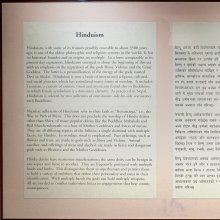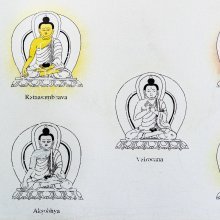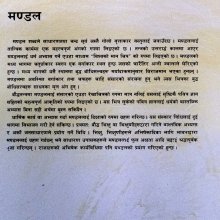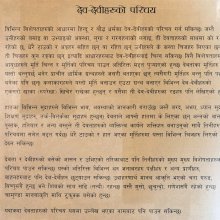Dharmika, Dhārmika: 17 definitions
Introduction:
Dharmika means something in Hinduism, Sanskrit, the history of ancient India, Marathi, Hindi. If you want to know the exact meaning, history, etymology or English translation of this term then check out the descriptions on this page. Add your comment or reference to a book if you want to contribute to this summary article.
Dharmika has 16 English definitions available.
Alternative spellings of this word include Dharmik.
Images (photo gallery)
(+1 more images available)
Languages of India and abroad
Sanskrit dictionary
[Deutsch Wörterbuch]
Source: Cologne Digital Sanskrit Dictionaries: Böhtlingk and Roth Grosses Petersburger WörterbuchDharmika (धर्मिक):—[Rāmāyaṇa 2, 33, 17.] gaṇa purohitādi zu [Pāṇini’s acht Bücher 5, 1, 128.] [Vyutpatti oder Mahāvyutpatti 21. 93.] wohl nur fehlerhaft fur dhārmika .
--- OR ---
Dhārmika (धार्मिक):—(von dharma)
1) adj. f. ī Recht übend, gerecht, seine Pflichten erfüllend, tugendhaft [Pāṇini’s acht Bücher 4, 4, 41.] [Trikāṇḍaśeṣa 3, 1, 12.] = dharmamadhīte veda vā gaṇa ukthādi zu [Pāṇini’s acht Bücher 4, 2, 60.] [Chāndogyopaniṣad 8, 15.] [Manu’s Gesetzbuch 2, 109. 3, 263. 4, 153. 8, 29.] [Yājñavalkya’s Gesetzbuch 1, 309.] [Mahābhārata 1, 1635.] [Rāmāyaṇa 1, 1, 87. 2, 36, 26.] [Varāhamihira’s Bṛhajjātaka S. 101, 11. 14.] [Kathāsaritsāgara 9, 47.] [Bhāgavatapurāṇa 1, 12, 24. 9, 2, 25.] f. ī [Mahābhārata 13, 2243.] [Rāmāyaṇa] [Gorresio 1, 40, 4.] auf das Recht, die Tugend gerichtet, darauf beruhend, damit in Einklang stehend: buddhi [Rāmāyaṇa] [SCHL. 1, 11, 11.] vacas [?2, 106, 1 (Gorresio 113, 1).] Vgl. a . —
2) m. Richter [Hemacandra’s Abhidhānacintāmaṇi 724.]
Source: Cologne Digital Sanskrit Dictionaries: Sanskrit-Wörterbuch in kürzerer FassungDharmika (धर्मिक):—fehlerhaft für dhārmika.
--- OR ---
Dhārmika (धार्मिक):——
1) Adj. (f. ī) — a) Recht übend , gerecht , seine Pflichten erfüllend , tugendhaft. — b) auf das Recht , auf die Tugend gerichtet , darauf beruhend , damit in Einklang stehend. —
2) — a) *Richter. — b) Betbruder [Kād. (1872) 256,19.23.258,5.] — c) Zauberer [297,31.(] im Prākrit).
Sanskrit, also spelled संस्कृतम् (saṃskṛtam), is an ancient language of India commonly seen as the grandmother of the Indo-European language family (even English!). Closely allied with Prakrit and Pali, Sanskrit is more exhaustive in both grammar and terms and has the most extensive collection of literature in the world, greatly surpassing its sister-languages Greek and Latin.
See also (Relevant definitions)
Starts with: Dharmika-karya, Dharmika-kshetra, Dharmika-sahishnuta, Dharmikamatha, Dharmikashikshana, Dharmikasthana, Dharmikata, Dharmikatana, Dharmikate, Dharmikatva.
Ends with: Adharmika, Anudharmika, Drishtadharmika, Natyadharmika, Paramadharmika, Pattaka-dharmika, Saddharmika, Sadharmika, Sahadharmika, Sahajadharmika, Saudharmika, Sudharmika, Vaidharmika, Vasudharmika, Vidharmika.
Full-text (+20): Adharmika, Dharmikata, Devila, Drishtadharmika, Dharmikatva, Vidharmika, Pattaka-dharmika, Tanmikan, Stratonos, Dharmik-sahishnutaa, Natyadharmika, Dharmikya, Sahajadharmika, Ganacakraka, Dhammia, Dhammiga, Hasaka, Viprapriya, Karunapara, Karunamaya.
Relevant text
Search found 24 books and stories containing Dharmika, Dhārmika; (plurals include: Dharmikas, Dhārmikas). You can also click to the full overview containing English textual excerpts. Below are direct links for the most relevant articles:
Bhakti-rasamrta-sindhu (by Śrīla Rūpa Gosvāmī)
Verse 2.1.126 < [Part 1 - Ecstatic Excitants (vibhāva)]
Verse 2.1.26 < [Part 1 - Ecstatic Excitants (vibhāva)]
Verse 3.2.15 < [Part 2 - Affection and Service (dāsya-rasa)]
Yoga-sutras (with Bhoja’s Rajamartanda) (by Rajendralala Mitra)
Sūtra 2.36 < [Second Chapter (Sadhana Pada)]
Tibetan tales (derived from Indian sources) (by W. R. S. Ralston)
Manusmriti with the Commentary of Medhatithi (by Ganganatha Jha)
Verse 3.263 < [Section XVIII - Disposal of Offerings]
Verse 7.174 < [Section XII - Daily Routine of Work]
Verse 8.221 < [Section XXXVII - Breach of Contract]
Maha Prajnaparamita Sastra (by Gelongma Karma Migme Chödrön)
The world of transmigration < [Chapter XXVII - The Virtue of Exertion]
Part 3 - Explanation of the word Bhikṣu < [Chapter VI - The Great Bhikṣu Saṃgha]
Chaitanya Bhagavata (by Bhumipati Dāsa)
Verse 3.4.353 < [Chapter 4 - Descriptions of Śrī Acyutānanda’s Pastimes and the Worship of Śrī Mādhavendra]
Verse 3.3.482 < [Chapter 3 - Mahāprabhu’s Deliverance of Sarvabhauma, Exhibition of His Six-armed Form, and Journey to Bengal]
Verse 2.15.4 < [Chapter 15 - Descriptions of Mādhavānanda’s Realization]
